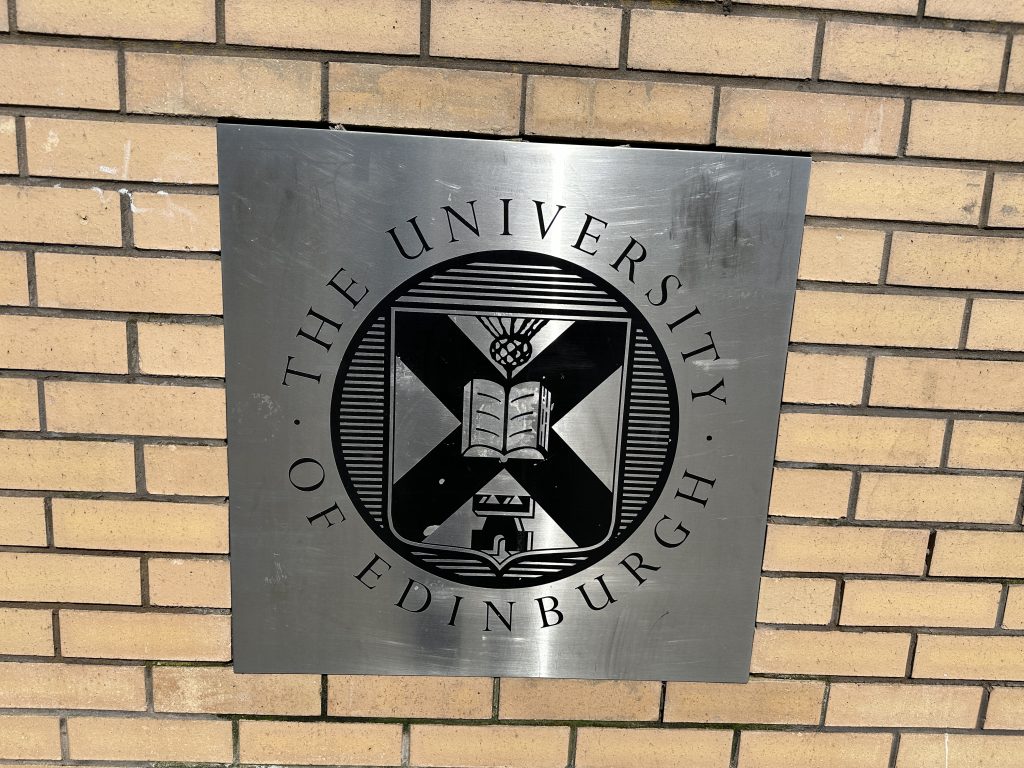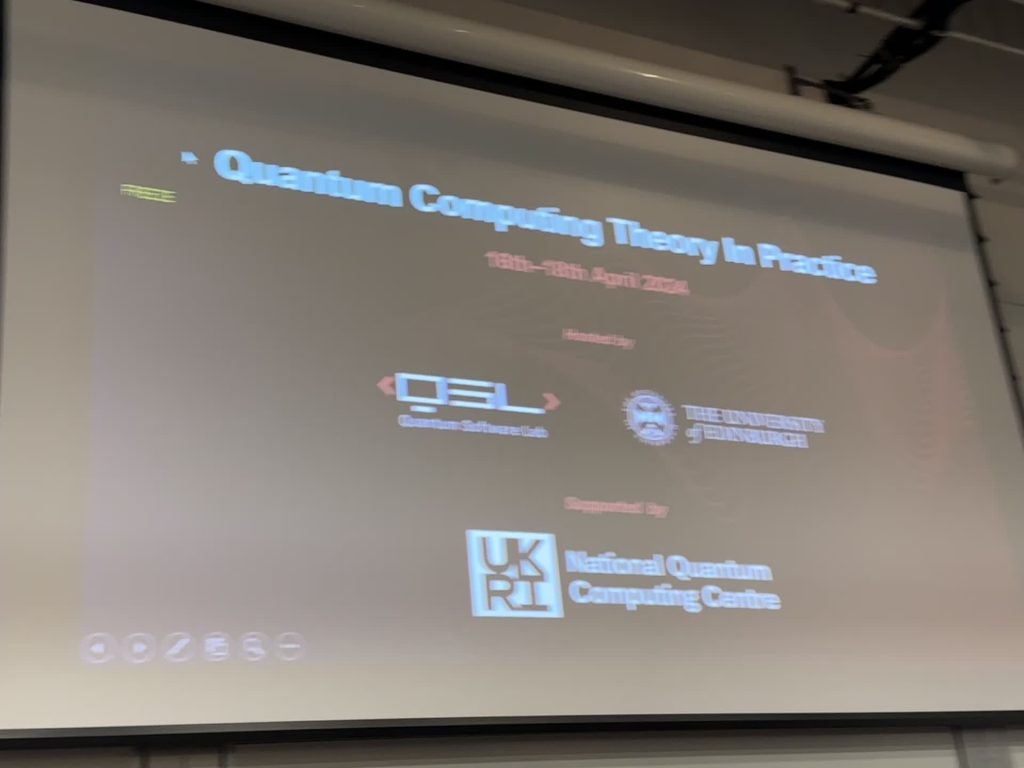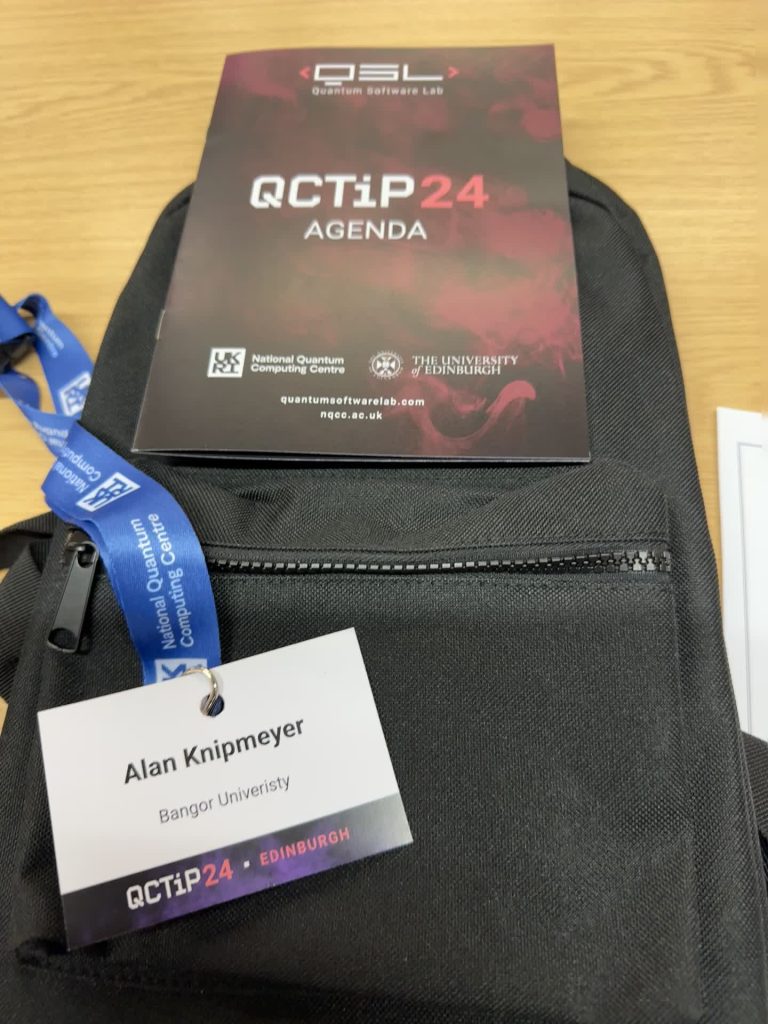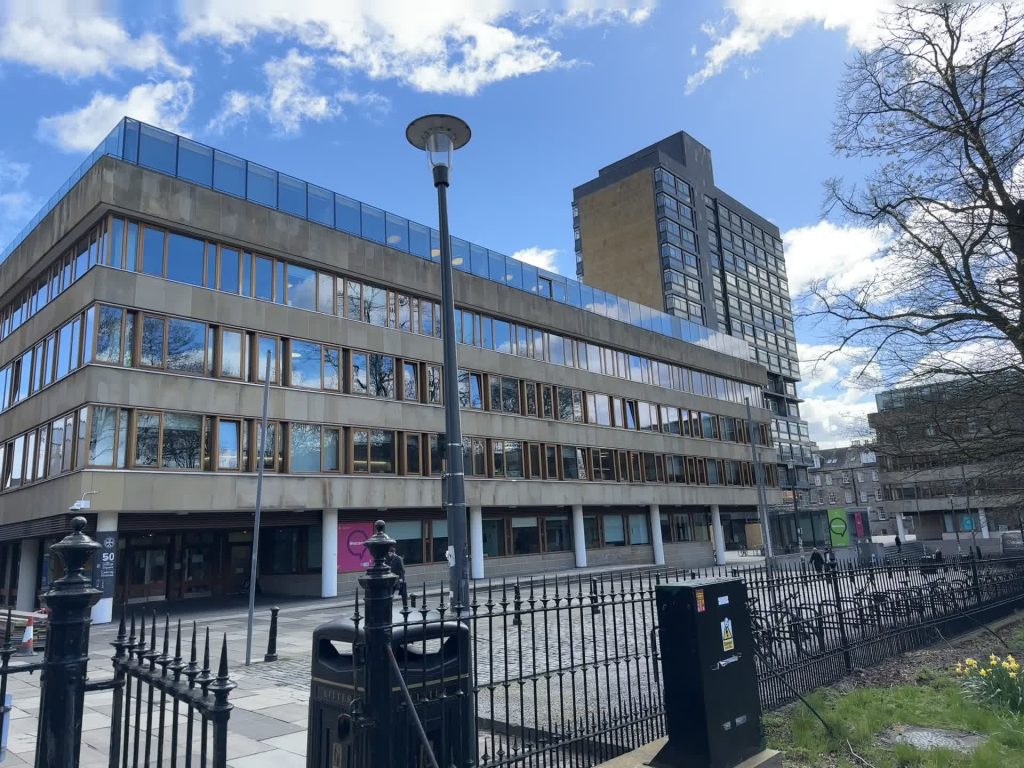Pre-talk prep
Ahead of going to to the talks I made a list of the specific talks I wanted to got and the related papers, I also bought several books (which will be in a separate posting) on the fundamentals of Quantum Computing. I found the following video accessible and succinct in understanding more about Quantum Computers.
QCTiP Event in Edinburgh
April saw Quantum Computing Theory in Practice 2024 event hosted at the University of Edinburgh. I was able to attend with student rates and online registration really helped. There was a fair amount of organization to be able to attend, as I would be mixing work with attending the event, this meant having a hotel near the venue, and also able to work well. I was glad to find the Residence Inn by Marriott which was near the university and had a decent desk to work from.
Day 1 (AM)


Having had my first day working from the hotel and enjoying a nice evening visiting Greyfriars bobby I headed to Day 1 (Tuesday) of QCTiP, which involved registration and for myself a morning of talks as it was back to work in the afternoon.
Registration was quite well organized with a good map on where to go provided by the organizers and badge pick up done on surname, i was soon picking up my Id, gift pack and attending my first talks.
| Presenter | Presentation Title | Academic publication |
| Zoë Holmes | Does provable absence of barren plateaus imply classical simulability? | https://arxiv.org/abs/2312.09121 |
| Diego Ruiz | LDPC-cat codes for low-overhead quantum computing in 2D | https://arxiv.org/abs/2401.09541 |
| Armanda O. Quintavalle | Partitioning qubits in hypergraph product codes to implement logical gates | https://arxiv.org/abs/2204.10812 |
| Shin Ho Choe | How to fault-tolerantly realize any quantum circuit with local operations | https://arxiv.org/abs/2402.13863 |
Barren Plateaus presented by Zoe Holmes
The first presentation on barren plateaus had me making notes on specific points I would continue to research, such as barren plateaus in general and Heisenberg principal (which comes up alot in quantum computing). I personally found that there was alot of information in this presentation and delivered at pace, with it being 50 minutes long (including questions) maybe focus could of been on specifics without too much generalization – the visuals didn’t add a great deal for me and was cluttered, even being sat at the front the countless lines of cited articles splashed onto a page added little, asides that the paper itself had been well researched by the group of researchers that had written it.
I found that reading the abstract of the paper helped a great deal in understanding the fundamentals of the presentation, if only it had been done with a linear pace, I would of personally benefited more from it. The positives of this presentation was that I am in the process of reading the publication objectively and also the other areas already linked for more information.
LDPC-cat codes for low-overhead quantum computing in 2D presented by Diego Ruiz
Quantum low-density parity-check (LDPC) is not an area I had previously encountered and was interested to see this presentation by Diego. I was immediately drawn to the simple, clear visuals and explanation of the material, I couldn’t understand all of the information presented, but this provided me with further material to research. The section of the presentation on CNOT gate via a lattice was very interesting, with my background being mostly in classic computing, I could grasp the logic and then the transposition into the quantum environment – more questions to be answered, but needless to say, added benefit to attending this excellent presentation. Undoubtedly I will read the reference publication and Diego certainly had an air of confidence in the work as shown in the excellent Q&A of this presentation.
Partitioning qubits in hypergraph product codes to implement logical gates presented by Armanda O. Quintavalle
I found this presentation and the language used very accessible, as a student getting into quantum computing, Armanda’s presentation clearly laid out the contents of his publication. The section on Clifford Travesel gates particularly made me want to find out more about the logic gates and their uses. The video from IQIS at 2:42 is quite interesting goes into Clifford Gates, and helps add more understanding to Armanda’s presentation and publication.
How to fault-tolerantly realize any quantum circuit with local operations presented by Shin Ho Choe
This was an excellent presentation for someone like myself getting into Quantum computing, I found the language and mix of classical computing with quantum computing easier to grasp than some of the more theoretical quantum presentations (not that they was not good, but not as easy for me to understand given my depth of knowledge so far). Whilst quantum entanglement still seems like ‘magic’ to me, the description of entanglement swapping was really good. I can really recommend reading this part of the publication to get a better understanding of entanglement and then how this works over ‘noisy’ environments allowing for the fault tolerant communication between qbits.



Day 2 (PM)
| Presenter | Presentation Title | Academic publication |
| Ioannis Kolotouros | Adiabatic quantum computing with parameterized quantum circuits | https://arxiv.org/abs/2206.04373 |
| Ioannis Kolotouros | Big data applications on small quantum computers | https://arxiv.org/abs/2402.01529 |
| Luka Skoric | A real-time, scalable, fast, and highly resource efficient decoder for a quantum computer | https://arxiv.org/pdf/2309.05558.pdf |
| Alexandra Moylett | Compilation of a simple chemistry application to quantum error correction primitives | https://arxiv.org/abs/2307.03233 |
| Marco Fellows Asiani | Minimizing the resources required by large-scale quantum computers, beyond algorithmic quantities | https://arxiv.org/abs/2112.04022 |
Day 2 saw me working from the hotel room then off to the convention in the afternoon, sadly I missed some of the talks on Machine Learning because of this but was glad to see the ones that I did, also it gave me time to have a break from work before heading to the convention, which helped me concentrate on the talks being given.
Adiabatic quantum computing with parameterized quantum circuits & Big data applications on small quantum computers presented by Ioannis Kolotouros
The first thing I done was to look up the meaning of adiabatic – the amount of new words introduced to my vocabulary since starting to learn about quantum computing has increased several times over !
It was good to see Ioannis describe the simulation software used, and whilst I found some visuals such as chart to have illegible labels, the formulas and bullet points where clear and with Ioannis’s explanation easier to understand.
For me the presentation on Adiabatic quantum computing whilst interesting was very complex but has inspired me to take the time to read the paper. There are several videos on YouTube discussing Adiabatic Quantum Computing, so far I have found this one to be the most useful in my learning.
Big data applications on small quantum computers
Ioannis’s second presentation was on Big data applications on small quantum computers. The title really peaked my interest and the presentation didn’t disappoint. Whilst a smaller presentation, it was filled with facts and information that was supported by a good presentation.
Today Quantum computers are ‘small’ compared to the amount of Qbits that would be required for reliable business/commercial use, however in this presentation it was great to see what can be achieved today on the available resources. As someone who wants to at least understand the potential use of Cryptanalysis on quantum computing this approach resonated with me.
Needless to say, i shall be reading the publication many times over. The article it cites [1] has a you tube video by the author Aram Harrow making the information furthermore accessible and easier to consume.
A real-time, scalable, fast, and highly resource efficient decoder for a quantum computer presented by Luka Skoric
This presentation grabbed my attention immediately. Luka had great stage presence and was able to deliver his slides and information really well. This was an area that was perfect for my grasp on quantum and classic computing with real time systems in the use of FGPA and ASIC as a hardware replacement for software based error encoding.
There’s a great deal of complexity but combined with the excellent visuals, I was enthusiastic to learn more, sadly the presentations where very much time-bound, but I could of listened to Luka talk for hours on the FGPA/ASIC hardware. I shall be reading the paper with great curiosity and endeavor to learn more from it.
I found this excellent video (sadly Q&A is missing) but the use of FGPA in Quantum Computing looks a good way forward.
Compilation of a simple chemistry application to quantum error correction primitives presented by Alexandra Moylett
I started off being able to follow this excellent presentation, but as it continued I probably found the boundary of my concentration / ability to make good notes and interpretations of what was being presented.
I was glad to understand some of what Alexandra was presenting and made note at least to read the paper, which contains a great deal on Quantum Error Correction, again a new subject to myself ahead of this weeks presentations, but the paper makes great reading and with plenty of explanation. What is also great is that the code that supports the theorys are available on github
I found the following video below helpful in understanding Quantum Error Correction, yet again like many videos on YouTube, is somewhat ruined by the unnecessary use of constant music. I wish they would stop this.
Minimizing the resources required by large-scale quantum computers, beyond algorithmic quantities presented by Marco Fellows Asiani
This was the last presentation for the day, and the previous presentation was a real drain on my capacity, but as soon as Marco got on the stage for his presentation it was like I had drunk a liter of red bull – his energy and enthusiasm from his presentation was amazing !
I was immediately drawn into the excellent slides, clean easy to read and understand with a full-on engaging presentation. I had never considered quantum energy efficiency, but undoubtedly the message was clear here, quantum computers will consume alot of resources.
The large amount of theory in the paper was easily digestible by Marco’s presentation. I only wish it could of gone on longer.
Day 3 (AM)
| Presenter | Presentation Title | Academic publication |
| Christoph Sunderland | Generalized quantum singular value transformation | https://arxiv.org/abs/2312.00723 |
| Thais de Lima Silva | Randomized semi-quantum matrix processing | https://arxiv.org/abs/2307.11824 |
| Dominik Leichtle | Verification of quantum computations without trusted preparations or measurements | https://arxiv.org/abs/2403.10464 |
Generalized quantum singular value transformation presented by Christoph Sunderland
Christoph’s presentation started strong and carried on that way, with excellent visuals and good descriptions of what singular value transformations are, I found that I could grasp the subject and want to find out more.
As with alot of quantum computing, this presentation contained alot of algorithms – my linear algebra has never been particularly good, but I was at least able to understand what GQST is.
I think as this was the 3rd day the time allowed for presentations was getting a little ‘looser’ as the Q&A session really over-ran but it was great to see and hear some intriguing dialogue about quantum computing.
This will be a paper I return to as my knowledge of Quantum computing expands. I found this video useful, in particular to be able to pause the video and look at the references within it.
Randomized semi-quantum matrix processing presented by Thais de Lima Silva
This was an interesting presentation, and thankfully I had at least some grounding in the theory behind it having done studies/research into random walk theory, made it a little more accessible. I’ve not yet done the combination of ML/DL and RWT, so this would be a really interesting presentation.
Thais made excellent use of visualizations and the use of Deep Quantum circuits. The math/linear algebra was quite heavy on this, but reading the paper after the presentation helps somewhat in understanding it a little better – I certainly see that I need to improve/brush up on my linear algebra to get more from these excellent publications !
I found the following video useful as a combination of some the areas Thai’s presentation covered, for sure I will review both together as my understanding and comprehension of the material improves.
Verification of quantum computations without trusted preparations or measurements presented by Dominik Leichtle
Prior to the presentation myself and another coworker had been discussing this very subject – how to ensure that between the quantum computer and the classic computer the results are correct. This presentation really resonated with me as having a background in networking and transportation protocols that some of that knowledge would be useful for this talk.
The slides where fun and informative, and this was noted in the Q&A, that many found the presentation of secure communication with quantum computers really good. There was plenty of clear information in the presentation that supported the paper that I skimmed thru whilst the presentation was happening. It was amazing to see how even in the realms of quantum computing that communications could be subjugated and at risk of exploits.
The use of simple Quantum circuits to demonstrate the verification also really helped me grasp more fundamental quantum computing principals, as show in Single-Plane Remote State Preparation (SP-RSP).
Overall, this was a brilliant presentation and with my schedule of work coming in headed off back to the nearby hotel to get my notes into a better form so I wouldnt forget them (which was used as the basis of his blog!)
I found this video on SQC to be really helpful, especially like other youtube videos I have used, being able to pause the video and compare my notes with publications.
QCTiP Summary
This was my first ever attendance of a Quantum Computing event, whilst I had done some pre-reading to get some knowledge, it was a steep learning curve, but from each of the presentations I gained more knowledge and also more material for my own research. Whilst all the presentations had merit, i’ll be focusing on the following, as I’m sure they will advance my research on Cryptanalysis and how I can use Quantum Computing as part of that.
- Areas for research based on findings so far
- Big Data Applications on small quantum computers
- FGPA & ASIC decoders (software, and physical)
- Secure Delegate Quantum Computing (Quantum computing as a service)
- Quantum Computing over classical networks
I’m really excited to be finding more publications and presentations on Quantum computing in 2024, and hope that I can contribute to the research going forward.
Appendix – Flying by air
TL/DR – I flew up, and got the train back. I was back home before the plane left and could actually read on the train and do some work.
Skip this section if you come to read about academics, but I will include this here as having been a previous frequent flyer of many other airlines want to recount my experience. I near an airport which has direct flights to Edinburgh, which makes you think this would be the optimal way to get to the event. As such I found there offset of ‘hassles’ vs ‘shortened travel time’ was far in excess, in particular my ‘bad luck’ continued in Edinburgh.
The airline I was using advised arriving at least 2 hours early, to which I did, by arriving 3 hours, as is I had one piece of luggage to go in the hold, but I couldn’t check in until 2 hours, so spent an hour waiting to queue to check in luggage. As I was working I had all the technical equipment with me, I also brought my radio and batterys along, as well the medical equipment I need (and pre-booked). Getting this thru security is fine with me, but it takes time.
I then waited for an hour on the gate-side and with ‘speedy boarding’ (you get to go on first…) put my luggage into the overhead. Hoping to read a book, let alone a computer with papers, was impossible due to the lack of space. I was squeezed in for 90 minutes of departure/flight and landing, basically more dead time. By now it was nearly midnight and arrived in Edinburgh, which is an International airport with frequent and many flights in and out of it to all parts of Europe and globally. The flight I arrived on was in the furthest part of the airport from the exit/entrance with travelators either not working, or going in the wrong direction.
Once thru baggage reclaim I saw quite a substantial amount of passengers waiting, maybe this was just normal (turns out its not). I then headed to the taxi rank – and waited – for over an hour for a taxi – turns out that a ‘festival’ was being held near the airport. This was off the roundabout which gives access to the airport, and with no traffic control in place meant taxis could not get in or out of the airport, hence people where missing flights and people arriving had no taxis.
After an hour of waiting after a miserable flight, I arrived at my hotel strongly considering my return route home not being by air – it was a complete loss of at least 8-9 hours in my day and utterly miserable experience of no overall benefit. Its very likely that any future travel for me will either be by car (1st choice) or train.
I will for sure no longer be using budget airlines because the lack of time to do any work at all, inconvenience and stress is not worth any amount of ‘cost savings’ which is in the ticket price.